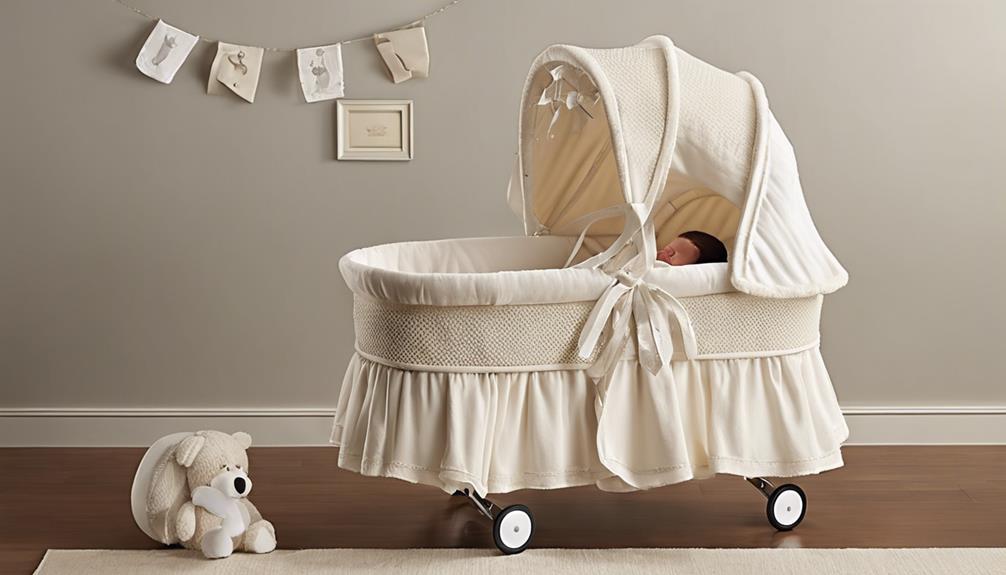Have you ever wondered why your newborn seems to fight sleep like a champion boxer in the ring? They might have some pretty compelling reasons for their nighttime behavior.
From hunger pangs to the mystery of sleep associations, these tiny humans sure know how to keep us on our toes.
Let's unravel the secrets behind their sleep struggles and explore ways to help them drift off peacefully.
Key Takeaways
- Tiny stomachs need frequent feedings affecting sleep patterns
- Room temperature impacts sleep quality and overheating risks
- Sleep associations and overstimulation disrupt newborn sleep
- Diaper rash, colic, and separation anxiety contribute to sleep disturbances

Zarbee's Baby Sleep Spray; Calming Bedtime Spray with Natural Lavender and Chamomile to Help Infant Nighttime Routine; 2oz Bottle
CALMING SPRAY FOR BABIES: A great addition to baby’s sleep routine, this Calming Spray is made with lavender…
As an affiliate, we earn on qualifying purchases.
As an affiliate, we earn on qualifying purchases.
Hunger
When caring for a newborn, understanding hunger as a primary reason for sleep disruptions is important in ensuring both baby and parents get adequate rest.
Newborns have tiny stomachs that need frequent feedings, causing them to wake up often throughout the night. If a baby is hungry, they may struggle to settle and sleep, leading to disrupted sleep patterns.
Ensuring that your baby is adequately fed during the day can help reduce nighttime waking due to hunger. It's common for newborns to wake up at night seeking nourishment, making feedings a frequent cause of sleep disturbances.
Hunger can drive newborns to wake up more frequently, resulting in fragmented sleep for both the baby and parents. By recognizing hunger cues and responding promptly with feedings, you can help your baby establish healthier sleep patterns and promote better rest for the whole family.

Desitin Maximum Strength Baby Diaper Rash Cream, 40% Zinc Oxide, Hypoallergenic No Added Parabens & Dyes, Protects & Relieves Baby’s Skin for Up to 12 Hours, Prevents Diaper Rash, 4.8 oz Tube
Maximum Strength Diaper Rash Cream: Desitin diaper cream contains 40% zinc oxide to treat and prevent diaper rash…
As an affiliate, we earn on qualifying purchases.
As an affiliate, we earn on qualifying purchases.
Discomfort

We comprehend the challenges of soothing a newborn who can't sleep due to discomfort. Diaper rash discomfort, clothing that's too tight, or a room temperature that's too hot can all contribute to your baby's unease.
Let's explore these points to help you identify and address potential sources of discomfort for your little one.
Diaper Rash Discomfort
Diaper rash discomfort can disrupt your newborn's sleep by causing irritability and difficulty settling down. Skin irritation from diaper rash may lead to increased fussiness during diaper changes and bedtime, making it challenging for your baby to stay asleep. Taking steps to treat diaper rash promptly can alleviate discomfort and improve sleep quality. Using gentle, fragrance-free diaper creams and changing diapers frequently can prevent diaper rash discomfort, promoting better sleep for your little one. Below is a table highlighting key points about diaper rash discomfort:
| Key Points |
|---|
| Disrupts sleep |
| Causes irritability |
| Difficulty settling down |
Understanding and addressing diaper rash discomfort is essential for ensuring your newborn's comfort and restful sleep.
Clothing Too Tight
To guarantee your newborn's comfort and promote better sleep quality, it's important to be mindful of the potential discomfort caused by tight clothing. Here are some practical tips to make sure your baby sleeps soundly:
- Choose Wisely: Select clothing made from soft, breathable fabrics like cotton to prevent irritation during sleep.
- Avoid Constricting Materials: Steer clear of tight elastic bands or clothing that restrict your baby's movements.
- Check for Signs: Keep an eye out for signs of discomfort such as fussiness or red marks on the skin from tight clothing.
- Opt for Comfort: Loose, comfortable clothing allows your newborn to move freely, aiding in promoting better sleep quality.
Room Temperature Too Hot
Maintaining a comfortable room temperature is essential for ensuring your newborn's sleep quality and overall well-being. Overheating due to a room temperature that is too hot can make your baby restless and uncomfortable, disrupting their precious sleep. Babies are more sensitive to heat than adults, so it's crucial to keep the room temperature optimal. The ideal range for a newborn's sleep is around 68-72 degrees Fahrenheit (20-22 degrees Celsius). Avoid overheating as it can increase the risk of Sudden Infant Death Syndrome (SIDS). Watch for signs of overheating like sweating, flushed skin, or rapid breathing, and adjust the room temperature accordingly.
| Signs of Overheating | Room Temperature (Fahrenheit) | Room Temperature (Celsius) |
|---|---|---|
| Sweating | Over 72°F | Over 22°C |
| Flushed skin | ||
| Rapid breathing |

Sense-U Pro Baby Monitor – Breathing Movement, Rollover & Overheating Trackers for Better Sleep, Simple Clip-On Smart Sleep Monitor with Arousal Vibration, Audible Alerts & Sleep Analysis
SIMPLY CLIP-ON, QUICK ALERTS FOR BETTER SLEEP: The Sense-U Pro baby monitor clips easily onto your baby’s diaper…
As an affiliate, we earn on qualifying purchases.
As an affiliate, we earn on qualifying purchases.
Overstimulation

Experiencing overstimulation can make it challenging for newborns to settle down and sleep peacefully. Here are some tips to help you recognize and address overstimulation in your baby:
- Create a Calm Environment: Dim the lights, reduce noise levels, and engage in soothing activities before bedtime to help your newborn relax and unwind.
- Watch for Signs of Overstimulation: Be mindful of cues like avoiding eye contact, arching their back, or increased fussiness, as these may indicate that your baby is overwhelmed.
- Establish a Bedtime Routine: Consistency in bedtime rituals can signal to your baby that it's time to wind down and prepare for sleep, reducing the risk of overstimulation.
- Limit Stimulating Activities: Avoid excessive playtime or exposure to loud noises before naps or bedtime to prevent overstimulation and promote better sleep quality for your little one.

Parumia Unisex Baby Long-Sleeve Onesie Bodysuit – 100% Organic Cotton, Soft and Breathable Baby Clothes – (3-6 Months)
Ultra-Soft Organic Cotton: Crafted from 100% organic cotton, this baby onesie is gentle on soft skin, ensuring breathability…
As an affiliate, we earn on qualifying purchases.
As an affiliate, we earn on qualifying purchases.
Sleep Associations

Understanding your baby's sleep associations is important for promoting healthy sleep habits and encouraging independent sleep. Babies often form associations with specific actions or objects that help them fall asleep, such as being rocked or using a pacifier. While these associations can initially aid in soothing your baby to sleep, they may also lead to difficulties in self-soothing and frequent night waking.
To help your baby learn to fall asleep independently and sleep through the night, it can be beneficial to break these sleep associations gradually. Consistent bedtime routines play a critical role in creating positive sleep associations and establishing good sleep habits. By following a predictable routine each night, your baby can learn to associate these actions with sleep, making bedtime smoother and more restful for both you and your little one.
| Tips for Breaking Sleep Associations | Benefits of Consistent Bedtime Routines |
|---|---|
| – Gradually reduce dependency on sleep aids | – Promotes relaxation and signals bedtime |
| – Offer comfort through gentle reassurance | – Establishes a sense of security and predictability |
| – Encourage self-soothing techniques | – Helps regulate your baby's sleep-wake cycle |
| – Stay consistent and patient throughout the process | – Creates a calming environment for better sleep quality |
Growth Spurts

I comprehend how growth spurts can throw a wrench in your newborn's sleep routine.
During these periods, babies may experience sleep regression due to their increased feeding demands.
Recognizing these signs can help you adjust your baby's sleep schedule accordingly.
Sleep Regression During Growth
During growth spurts, newborns may struggle with disrupted sleep patterns due to increased hunger and the need for more frequent feedings. Here are some key points to take into account:
- Increased Hunger: Babies may seem hungrier than usual, leading to more frequent feedings throughout the day and night.
- Fussiness and Clinginess: Your baby might be more irritable and demanding during these periods, making it challenging for them to settle down for sleep.
- Timing of Growth Spurts: Keep in mind that growth spurts commonly occur around 2 weeks, 6 weeks, 3 months, and 6 months of age, affecting sleep patterns at these stages.
- Shorter Sleep Durations: Be prepared for shorter naps and more night wakings as your little one's body requires extra nourishment for rapid development.
Increased Feeding Demands
Coming out of a period where your newborn may have been fussier and more demanding due to growth spurts, you may notice an increase in feeding demands as they endeavor to meet their growing needs. Babies experiencing growth spurts often require more frequent feedings, even during the night, to support their rapid development. It's important to understand that these increased feeding demands are a natural part of their growth process. Responding to your baby's hunger cues promptly during these times is vital to make sure they receive the extra nutrients necessary for their overall well-being. Below is a table highlighting the typical ages when growth spurts occur:
| Age Range | Common Growth Spurt Periods |
|---|---|
| 7-10 days | Early growth spurt |
| 2-3 weeks | First few weeks |
| 4-6 weeks | One-month growth spurt |
Teething

Experiencing teething can be a challenging time for newborns and their caregivers due to the discomfort and sleep disruptions it can cause. When your little one is going through teething, here are some practical tips to help both of you navigate this phase:
- Teething Pain: Understand that teething pain can vary for each baby, but it often leads to irritability and disturbed sleep patterns.
- Discomfort Signs: Look out for signs like excessive drooling, swollen gums, and increased fussiness, as these can indicate your baby is teething.
- Teething Relief: Offer teething toys or chilled teething rings to help soothe your baby's gums and provide some relief from the discomfort.
- Consultation: Don't hesitate to consult your pediatrician for safe and effective pain relief options tailored to your newborn's needs during teething.
Sleep Regression

Traversing through sleep regression with your newborn can be challenging, but understanding the factors contributing to this phase can help you support your little one effectively. Around 4 months, disrupted sleep patterns may emerge, leading to more frequent night wakings, shorter naps, and struggles with falling asleep. Behavioral changes, growth spurts, and developmental milestones can all play a role in triggering this phase.
To help your baby navigate through sleep regression, consistency in bedtime routines is key. Establishing calming rituals before bedtime can signal to your little one that it's time to wind down. Offering comfort and reassurance during night wakings can also aid in soothing them back to sleep.
Colic or Gas
Dealing with colic or gas can be tough on both you and your newborn. Colic can trigger intense crying spells, making it hard for babies to settle down.
Gas discomfort can worsen at night, leading to frequent waking.
Colic Causes Sleep Issues
When colic or gas disrupt a newborn's sleep, it can be challenging for both the baby and the caregivers to find restful moments. Here are some reasons why colic causes sleep issues:
- Essential: Colic can result in prolonged periods of inconsolable crying, making it difficult for the baby to settle down for sleep.
- Gas Build-Up: Digestive issues like gas build-up can lead to discomfort, causing frequent night wakings and disrupted sleep.
- Evening Peaks: Colic episodes often peak in the evening, disrupting bedtime routines and making it harder for the baby to fall asleep.
- Soothing Techniques: Implementing soothing techniques and gas relief methods can help alleviate colic symptoms and improve the baby's sleep quality.
Managing colic effectively is essential for creating a more peaceful sleep environment for your newborn.
Gas Discomfort at Night
Gas discomfort at night can be a common challenge for newborns, leading to frequent wake-ups due to colic or trapped gas bubbles. Newborns experiencing gas discomfort may exhibit symptoms like crying, fussiness, arching their back, or pulling their legs up towards their belly. It can be tough to see your little one in discomfort, but there are ways to help alleviate their gas issues. One effective method is using gentle tummy massage techniques to aid in releasing trapped gas. Additionally, avoiding gassy foods if breastfeeding and ensuring your baby is in an upright position after feedings can also assist in reducing gas discomfort. Remember, a gentle touch and a soothing presence can go a long way in comforting your newborn during these challenging moments.
| Gas Discomfort Tips | Description |
|---|---|
| Tummy Massage Techniques | Help release trapped gas with gentle circular motions on the tummy. |
| Avoiding Gassy Foods | Breastfeeding mothers should steer clear of foods that can cause gas. |
| Keeping Baby Upright | After feedings, keep your baby upright to aid in digestion and reduce gas. |
Soothing Techniques for Colicky Babies
If your newborn is experiencing colic or gas discomfort, soothing techniques can provide relief and comfort during these challenging moments. Here are some practical tips to help soothe your colicky baby:
- Gently Massage: Try gently massaging your baby's tummy in a clockwise motion to help relieve gas and colic symptoms.
- Gas-Relief Drops: Consider using gas-relief drops or gripe water recommended by your pediatrician to provide relief for colicky babies.
- Upright Position: Hold your baby in an upright position after feeding to reduce gas buildup and alleviate discomfort.
- Probiotic Drops: Probiotic drops may help balance your baby's gut flora and potentially reduce colic symptoms.
These techniques can offer comfort and relief for your little one during colicky episodes.
Separation Anxiety

Experiencing separation anxiety is a common challenge for many babies as they navigate the journey of learning to sleep independently. This anxiety can emerge as early as 6-8 months old and peaks between 10-18 months. Babies may resist sleeping alone due to a fear of separation from caregivers, leading to manifestations like nighttime waking, crying, or difficulty falling asleep.
When your baby is struggling with separation anxiety at bedtime, it can be a tough situation for both of you. However, there are strategies that can help ease this change. Gradual separation techniques, such as establishing a consistent bedtime routine, providing comfort objects like a favorite blanket or toy, and slowly increasing the distance between you and your baby at bedtime, can assist your little one in adjusting to sleeping independently.
Developmental Milestones
As your newborn navigates through various developmental milestones, their sleep patterns may be impacted in different ways. Here are some ways in which developmental milestones can affect your baby's sleep:
- Motor Skills Advancements: When your baby is learning new motor skills such as rolling over or sitting up, they may be more restless during sleep as their bodies adjust to these changes.
- Cognitive Developments: As cognitive developments unfold, your baby may become more alert and curious, making it harder for them to settle down for sleep as they want to explore their surroundings.
- Teething and Solid Foods: Milestones like teething or starting solid foods can disrupt sleep patterns due to discomfort or changes in digestion, leading to more frequent awakenings during the night.
- Temporary Sleep Disturbances: It's common for babies to experience temporary sleep disturbances as they reach various developmental stages, so patience and a consistent bedtime routine can help navigate these challenges together.
Frequently Asked Questions
What Do You Do if Your Newborn Doesn't Want to Sleep?
When our newborn doesn't want to sleep, we comfort them with gentle techniques like rocking or swaddling. We guarantee all their needs are met, create a consistent bedtime routine, and monitor their cues for better sleep habits.
Why Is My Newborn Not Sleeping at All?
When our newborn won't sleep at all, exhaustion can overwhelm us. We must consider hunger, discomfort, overstimulation, and developmental changes like the 3-month sleep regression. Understanding these factors helps us navigate this challenging phase.
Is There a Medical Reason Newborn Won't Sleep?
Yes, there could be medical reasons why a newborn won't sleep. Reflux, colic, allergies, or sleep apnea are common culprits. Consulting a pediatrician is crucial to rule out any underlying medical issues affecting your baby's sleep.
What Causes Sleepless Nights in Newborns?
Nights with a newborn can be rough. Hunger, confusion, discomfort, stimulation, and teething all play a part. We've been there. Hang in there. Remember, it's a phase. Together, we'll find ways to soothe and settle.
Could Excessive Sleep Be a Sign of a Problem for a Newborn?
Excessive sleep in newborns can actually be a cause for concern. While newborn sleep patterns and limits can vary, sleeping excessively can indicate health issues such as jaundice, dehydration, or infection. It’s important for parents to monitor their baby’s sleep habits and consult a doctor if they have any concerns.
Conclusion
To sum up, it's important to remember that newborns have unique needs that can impact their sleep patterns.
One interesting statistic to ponder is that newborns typically sleep between 14-17 hours a day, but this can vary greatly from baby to baby.
By addressing common reasons for sleep disruptions and implementing strategies to promote better sleep habits, you can help your little one get the rest they need for healthy development.
Remember, you're not alone in this journey – seek support and guidance as needed.









